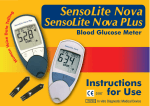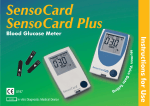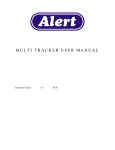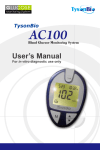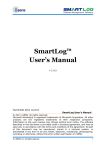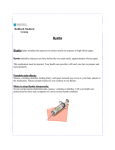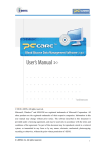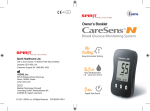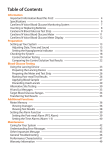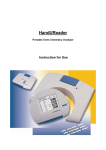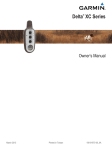Download AutoSense AutoSense Voice
Transcript
AutoSense & AutoSense Voice AutoSense AutoSense Voice Blood Glucose Meter Instructions for Use D61-9201-2_ beliv.indd 1 1 2012.11.13. 15:31:53 AutoSense & AutoSense Voice CONTENTS READ THIS BEFORE USING THE EQUIPMENT INTRODUCTION CONTENTS OF AUTOSENSE AND AUTOSENSE VOICE KIT AUTOSENSE METER EXPLAINED UNIQUE FEATURE OF AUTOSENSE VOICE FOR USERS OF PLASMA-EQUIVALENT CALIBRATED METERS PRECAUTIONS TECHNICAL DATA PARTS OF THE METER ABOUT THE TEST STRIP Strip insertion and use BEFORE TAKING MEASUREMENTS BLOOD SAMPLING STRIP-AUTOCODING MEASURING WITH THE METER Flagging and marking test results 4 5 6 7 8 9 11 12 13 14 16 17 18 20 22 27 22 D61-9201-2_ beliv.indd 2 2012.11.13. 15:32:05 29 29 30 31 32 32 33 35 36 37 38 39 40 44 45 45 47 49 56 57 AutoSense & AutoSense Voice MEMORY Storing data Recalling data from memory Average calculation OVERVIEW OF FUNCTION MENUS PC mode Setting date and time Alarm settings Switching to speaking function Deleting stored data Selecting unit of measurement Setting hypoglycemic limit BATTERY REPLACEMENT MAINTENANCE AUTOSENSE SYSTEM CHECKING Checking with Check-strip Checking with CareSens control solution ERROR MESSAGES AND TROUBLESHOOTING MANUFACTURER'S WARRANTY SYMBOLS 3 D61-9201-2_ beliv.indd 3 2012.11.13. 15:32:05 AutoSense & AutoSense Voice READ THIS BEFORE USING THE EQUIPMENT IMPORTANT! Before testing your blood with your AutoSense or AutoSense Voice Blood Glucose Monitoring System, please read this user manual carefully. For safe and easy operation, close study of the Instructions for Use of the meter and its accessories (lancing device, test strip) is necessary. Should you neglect to study this manual, you will not be familiar with the proper use of the equipment. Always consult your diabetes healthcare professional. This advice applies to all blood glucose monitoring systems. Always use the equipment only for the purpose described in this manual. Do not use accessories that are not supplied or recommended by the manufacturer or distributor. Do not use the equipment if it does not function properly. Ship and store the meter at −20°C to 50°C (−4°F to 122°F). 44 D61-9201-2_ beliv.indd 4 2012.11.13. 15:32:05 Thank you for choosing the AutoSense Blood Glucose Monitoring System. It has been carefully designed for easy, reliable, and accurate monitoring of your blood glucose level. This blood glucose meter meets international standards for the applicable EMC (Emectromagnetic Compatibility)- emission, electrostatic discharge, and radio frequency radiation. This manual is for both AutoSense and AutoSense Voice meters. The only difference between them is the speaking ability of AutoSense Voice. Therefore, if not specifically indicated, all instructions are relevant to both meters. AutoSense & AutoSense Voice INTRODUCTION Note: In this manual, if “AutoSense” is cited, it refers to both AutoSense and AutoSense Voice meters. To get the best from your AutoSense meter, please take the time to become familiar with it. Please read and understand the instructions in this manual before using your 5 D61-9201-2_ beliv.indd 5 2012.11.13. 15:32:06 AutoSense & AutoSense Voice meter. Follow the instructions provided in “Maintenance” to prolong the lifespan and accuracy of your meter. This manual should tell you everything you need to know about operating your AutoSense meter; however, it is recommended that you visit a medical doctor specializing in diabetes treatment if you require more advice. Keep this manual in a safe place so that you can access and refer to it any time. Please contact your local distributor if you have any technical questions not addressed in this manual. CONTENTS OF AUTOSENSE AND AUTOSENSE VOICE KIT AutoSense or AutoSense Voice Blood Glucose Meter Instructions for Use Illustrated Instructions for Use Lancing device Disposable, microbiologically sterile lancets (8 pcs.) Check-strip (1 pc.) All parts are microbiologically clean. 66 D61-9201-2_ beliv.indd 6 2012.11.13. 15:32:06 AutoSense indicates blood glucose concentration by checking the reaction between chemical reagents and the blood drop on the test strip. The reaction triggers the generation of a current in the test strip’s reagent zone, and this current is conducted to the meter. The current correlates with the blood glucose concentration. Therefore, the meter determines blood glucose concentration by measuring the extent of current flow. The entire measuring process is controlled by a microprocessor inside the AutoSense meter. AutoSense & AutoSense Voice AUTOSENSE METER EXPLAINED The microprocessor also controls the internal calibration of the device, and if any failure is detected during operation, a relevant error message is displayed (see “Error messages and Troubleshooting”). AutoSense automatically stores measured data together with the current date and time. The memory capacity is large enough to store the data from the last 500 tests. The stored data can also be uploaded to a host computer via IR interface with an additional device: LiteLink (shipped separately upon request). 7 D61-9201-2_ beliv.indd 7 2012.11.13. 15:32:07 AutoSense & AutoSense Voice UNIQUE FEATURE OF AUTOSENSE VOICE This feature is a great help for people who may have problems reading the characters displayed on the screen. By using the speaking function of AutoSense Voice, the possibility of misreading caused by poor sight can be reduced significantly. AutoSense Voice also vocalizes the important instructions and values displayed on the screen. The clear and simple sentences spoken by the device make AutoSense Voice an extremely easy-to-use blood glucose meter. No further explanation of the information vocalized by the device is required, as it is self-explanatory. Just follow the instructions as you hear them, and you will use AutoSense Voice without any difficulty. Audio data is available in 2 languages by default: English and German. Note: AutoSense Voice always emits a typical beeping sound when switching off. 88 D61-9201-2_ beliv.indd 8 2012.11.13. 15:32:07 This section refers only to users with a plasma-equivalent calibrated meter. If your meter is plasma-equivalent calibrated, then “Plasma-equivalent calibrated” is printed on the label on the back of your meter. Blood glucose measurements can be made either from whole blood or from plasma (the liquid portion of blood without red blood cells). Both methods are widely used, although neither is more accurate than the other is. However, there is a slight difference between the results obtained from the 2 samples. Plasma measurement values are generally 10%–15% higher than their whole blood equivalents. Thus, if a plasma result is 221 mg/dl, the whole-blood reading may be within the 190 mg/dl to 200 mg/dl range. Due to the slight difference, the resulting values obtained from the different methods cannot be compared simply. AutoSense & AutoSense Voice FOR USERS OF PLASMA- EQUIVALENT CALIBRATED METERS 9 D61-9201-2_ beliv.indd 9 2012.11.13. 15:32:07 AutoSense & AutoSense Voice The plasma-calibrated AutoSense meter displays the blood glucose measurement as obtained from plasma. Therefore, the glucose content displayed by the meter is the glucose content that would be in the plasma. Thus, the measurement can be easily compared with the results obtained from a laboratory that uses plasma for readings. IMPORTANT! The plasma-calibrated AutoSense meter uses only whole blood for reading. To obtain a result for plasma, the plasma-calibrated AutoSense meter converts the result of the whole-blood measurement to plasma glucose value.* * Paul D'Orazio, Robert W. Burnett, Niels Fogh-Andersen: Approved IFCC Recommendation on Reporting Results for Blood Glucose, IFCC-SD, WG-SEPOCT Document Stage 1, Draft 9, September 2003 1010 D61-9201-2_ beliv.indd 10 2012.11.13. 15:32:07 Always operate your AutoSense Blood Glucose Meter according to the instructions provided hereafter. If the equipment is used in a manner not recommended by this manual, the warranty provided by the manufacturer may be voided. It is essential to read and follow the information below: • AutoSense is designed to be used ONLY with an AutoSense Test strip and no other strips. • When inserting a new strip, always check if the code on the vial of strips you are using matches the code that appears on the display. If it does not, DO NOT use the strip to measure your blood glucose value (see “Strip Autocoding”). • Your AutoSense meter is calibrated to be used only with fresh capillary blood. Venous blood or plasma is not suitable for accurate monitoring of glucose levels. AutoSense & AutoSense Voice PRECAUTIONS 11 D61-9201-2_ beliv.indd 11 2012.11.13. 15:32:08 AutoSense & AutoSense Voice TECHNICAL DATA AutoSense / AutoSense Voice Batteries: Battery life: 1 pc. 3 V, type: CR2032/(2 pcs. 3 V, type: CR2032) 1 year or 1500 measurements/(1 year or 1000 measurements) Calibrated for: AutoSense Test strip Average test time: 5 seconds Required sample volume: Min. 0.5 μl capillary blood Measuring range: 1.1–33.3 mmol/l (20–600 mg/dl) Display: Below 1.1 mmol/l: Lo, above 33.3 mmol/l: Hi Memory capacity: Last 500 results with time and date Strip autocode range: 1–15 Coding system: Autocoding Automatic switch on: Upon insertion of test strip Automatic switch off: In 2 minutes after the last button activation Operating temperature: 10°C–40°C Relative humidity: <90% Size: 55 mm × 100 mm × 21 mm Weight: 60 g/ (90 g) with batterie(s) 1212 D61-9201-2_ beliv.indd 12 2012.11.13. 15:32:08 IR data output interface OK (ON/OFF) button Strip ejector button Display Strip holder slot SET button AutoSense & AutoSense Voice PARTS OF THE METERS Battery holder 13 D61-9201-2_ beliv.indd 13 2012.11.13. 15:32:08 AutoSense & AutoSense Voice ABOUT THE TEST STRIP Contact bars Confirmation window Edge to apply blood sample Your AutoSense meter is designed ONLY for in vitro use with an AutoSense Test strip. Other strips will not provide an accurate result. When inserting a new strip, always check if the code on the vial of strips you are using matches the code that appears on the display. The code does not match that on the vial, DO NOT use the strip to measure your blood glucose value. If the code numbers do not match, your measured result will be incorrect (see “Strip Autocoding”). Each vial of strips is also labeled with an expiry date. Always use the strips within 3 months from the date of opening and never use the strips if they have expired. 1414 D61-9201-2_ beliv.indd 14 2012.11.13. 15:32:09 Note: The AutoSense Test strip reacts with blood glucose, generating a current. The intensity of the current is proportional to the blood glucose concentration. The AutoSense meter detects the generated microcurrent and calculates the glucose concentration. AutoSense Test strips are sensitive to heat and mechanical damage—do not use the strips if you suspect that such damage may have occurred. Always keep the strips in their original package, and close the vial each time after removing a strip. AutoSense & AutoSense Voice Before testing, always ensure that both the meter and the strips are at room temperature. Do not expose the strips to direct sunlight or store them near any heating device (radiator, etc.). Unused strips that are stored in the original capped vial under the circumstances described in this section will remain stable until the expiration date (indicated on vial label). The test strips must be shipped and stored at 1°C–30°C (34°F–86°F). Avoid both freezing and extreme heat. 15 D61-9201-2_ beliv.indd 15 2012.11.13. 15:32:10 AutoSense & AutoSense Voice IMPORTANT! • • Read the AutoSense Test strip Instructions for Use before using them. • Use the removed strip immediately and always close the vial carefully immediately after removing a strip. • If the strips are stored below or above room temperature, wait at least 30 minutes before opening the vial. Always note the date when the vial is first opened, and use the strips within 3 months from that date. Strip insertion and use The strip must be inserted into the meter’s strip holder with the black side facing upwards and the square end pointing towards the device. The meter will switch on automatically upon the insertion of the test strip. Always ensure that the strip is completely and securely inserted into the center of the strip holder. Ensure that enough blood (0.5 μl) is applied to the reagent area located at the tip of the arrowhead-shaped end of the strip. The reagent window 1616 D61-9201-2_ beliv.indd 16 2012.11.13. 15:32:10 Sufficient amount of blood Insufficient amount of blood Note: The meter will switch on automatically upon insertion of the test strip. BEFORE TAKING MEASUREMENTS Readings might be affected by: • Skin contaminants: Always wash and dry your hands thoroughly before taking your blood sample and using AutoSense meter. Wash your hands with warm water, as this stimulates blood flow. If you have difficulties obtaining your blood sample, try dangling your arm downwards before pricking your finger. This helps to increase blood flow. D61-9201-2_ beliv.indd 17 AutoSense & AutoSense Voice at the end of the strip should be filled up completely if a sufficient amount of blood has been applied (see pictures): 17 2012.11.13. 15:32:11 AutoSense & AutoSense Voice • Severe dehydration may lead to low measurement values. • An abnormally high concentration of vitamin C (ascorbic acid) may lead to high measurement values. • The hematocrit (red blood cell volume) level in the blood may influence the measured results. If the hematocrit level is exceeds 55% (>55%), the measurement results may be too low; however, if the hematocrit level is below 30% (<30%), the meter may display unusually high results. • In case of dialysis the hematocrit level may vary. This may influence the displayed glucose level. BLOOD SAMPLING It is recommended to use the lancing device and disposable lancets packed together with the meter to prick your finger. If you use them, please read the following instructions: 1818 D61-9201-2_ beliv.indd 18 2012.11.13. 15:32:11 • Prick the side of your fingertip. However, any other part of your palm or forearm may be pricked. • Wipe off the blood that emerges initially after pricking, and then collect one drop without pressing your finger too hard. Pressing your finger pad from the lower part upwards will help you to produce a blood drop. WARNING! AutoSense & AutoSense Voice • Before using them, wash your hands thoroughly with warm water and dry them before pricking (thereby stimulating the blood flow). • Excessive rubbing may influence the measurement results. • Read the Instructions for Use for the lancing device before using it. • Dirt or contaminants on the finger or an insufficient amount of blood may lead to inaccurate results. 19 D61-9201-2_ beliv.indd 19 2012.11.13. 15:32:12 AutoSense & AutoSense Voice STRIP AUTOCODING Together, your AutoSense meter and AutoSense Test strip form an accurate measuring system. The AutoSense meter has an autocoding system to ensure that the meter and the strips work together properly. The meter automatically reads the code on the back of the strip after a strip is inserted (the code is assigned individually to each vial of strips). Manual coding of the meter is not needed. When inserting a new strip, always check if the code on the vial of strips that you are using matches the code that appears on the display (it influences the accuracy of the meter while it calculates glucose concentration). The code number can be any number from 1 to 15. If the code numbers do not match, DO NOT use the strip to measure your blood glucose value. In case you have an AutoSense Voice meter, the meter can also read out the code if the speaking function is switched on. 2020 D61-9201-2_ beliv.indd 20 2012.11.13. 15:32:12 AutoSense & AutoSense Voice IMPORTANT! • Verify that the code displayed matches the code number on the vial of test strips each time you use your meter. The meter will autocode each strip. The code number can be any number from 1 to 15. • If the code displayed upon insertion of a new strip does not match the code printed on the vial, DO NOT use the strip to measure your blood glucose value. WARNING! After strip insertion AutoSense meter displays the strip's code number until a sample droplet is applied. Verify that the code displayed matches the code number on the vial of test strips each time you use your meter. 21 D61-9201-2_ beliv.indd 21 2012.11.13. 15:32:12 AutoSense & AutoSense Voice MEASURING WITH THE METER Before you start the test, check that everything you might need is ready: meter, test strip, lancing device, some tissues. Now, put your meter on a clean, flat surface. Wash your hands thoroughly. 1. Switch AutoSense meter on either by inserting a test strip into the strip holder or by pressing the OK button. Upon insertion of a test strip, a code number will appear on the display. Compare the displayed code with the code printed on the vial label. It is also recommended to check the strips’ expiration date. If the meter is switched on by pressing the OK button, on the lower right side of the display, a strip icon will instruct you to insert the test strip. Take a test strip, and holding it by its arrowhead-shaped end, insert it firmly 2222 D61-9201-2_ beliv.indd 22 2012.11.13. 15:32:14 AutoSense & AutoSense Voice into the middle of the strip holder. The black side of strip must face up and it must be inserted all the way into the holder so that the manufacturer’s logo is visible at the entrance of the strip holder. If the strip has been inserted correctly, the display changes: a code number appears on the display until a blood droplet is applied to the strip. After that, a flashing blood drop icon will appear on the display, indicating that the meter is waiting for the blood sample. Note: The insertion of a test strip will switch on the AutoSense automatically 2. Prick your finger and gently squeeze out a small droplet of blood (0.5 μl is sufficient). Apply the blood droplet laterally to the tip of the arrowheadshaped end of the test strip. The blood should fill up the reagent zone 23 D61-9201-2_ beliv.indd 23 2012.11.13. 15:32:14 AutoSense & AutoSense Voice completely (see picture in “Strip insertion and use” paragraph in “About Test Strip”). An insufficient amount of blood might result in significant inaccuracy or failure of the test. 3. The flashing blood drop icon will stop flashing when the blood droplet touches the strip. A flashing horizontal bar in the middle of the display indicates that the meter is performing the test. The measurement is performed automatically. Do not move or touch the strip during this time. 4. On average measurements are made 5 seconds, after which the result is automatically displayed. AutoSense Voice not only displays but also vocalizes the result in a human voice. The meter will display “Lo” if the measured value is below 1.1 mmol/l (20 mg/dl) and “Hi” if the value exceeds 33.3 mmol/l (600 mg/dl). 5. When the result is displayed, you may mark (!) and/ or flag it with the SET button. If the SET button is pressed again, the next marking/flagging combination appears. For more information, refer to "Flagging and marking test results". 2424 D61-9201-2_ beliv.indd 24 2012.11.13. 15:32:15 Note: Marks can only be added or removed immediately after a measurement. They cannot be changed when recalling from the memory. 6. After completing the measurement, the test strip can be removed from the meter. Press the ejector button on the topof the meter to eject the strip. The test result will be displayed for 2 minutes, until the strip is removed, or the meter switched off. The meter will automatically store the result together with the actual test date and time. However, it is recommended that you always record the test result in a diabetes diary before switching the meter off. AutoSense & AutoSense Voice Marked results will be neglected in case of average glucose level calculation from the last 7-14-30-60-90 days' test results. For more information, refer to "Memory/ Storing" data. 25 D61-9201-2_ beliv.indd 25 2012.11.13. 15:32:16 AutoSense & AutoSense Voice The used strip and lancet are contaminated with blood. Be careful and follow the relevant local instructions when you discard the used strip and lancet. If an error message appears, refer to “Error messages and Troubleshooting.” WARNING! • If “Lo” is displayed as a result after testing it means that the measured value is too low, it is out of measuring range! Contact your healthcare professional immediately. • If “Hi” is displayed as a result after testing it means that the measured value is too high, it is out of measuring range! Contact your healthcare professional immediately. • Incorrect high or low results may have serious medical consequences. If your blood glucose is unusually high (greater than 16 mmol/l) or low (lower than 3 mmol/l), or if you question your results, repeat the test more carefully with a new strip. Consult your healthcare professional before making significant changes to your diabetes medication program. Do not ignore physical symptoms. 2626 D61-9201-2_ beliv.indd 26 2012.11.13. 15:32:17 D61-9201-2_ beliv.indd 27 AutoSense & AutoSense Voice • Electromagnetic interference and electrostatic discharge may interfere with the meter. Do not use it near highly radiant devices, e.g., mobile phones, microwave ovens. • Do not perform the test with a damaged test strip. • Ensure that the test strip is inserted properly. Improper positioning of the test strip will lead to an inaccurate test result. • Do not move or remove test strip during measurement. • Do not perform the test in extreme conditions. External temperatures that differ from the specified operating temperature range or too high humidity (e.g., a humid bathroom) might affect the accuracy of the test result! • If the meter has been stored in a place that is too cold or too warm, wait at least 30 minutes before use to ensure the meter and strip have reached room temperature. Flagging and marking test results At the end of each measurement, special flags and marks can be set to add information to each measurement. The SET button can define 11 different flag and marking combinations. By pushing the SET button, the following combinations can be set one in sequence: Mark, Premeal, 27 2012.11.13. 15:32:18 AutoSense & AutoSense Voice Mark & Premeal, Postmeal, Mark & Postmeal, Sport activity, Mark & Sport activity, Premeal & Sport activity, Postmeal & Sport activity, Mark & Postmeal & Sport activity. The last status is the unmarked or unflagged state. After selecting one flag and/or marking combination, it can be saved in the meter memory by pressing the OK button. After the OK button is pressed, the meter will switch off automatically. Premeal value 2828 D61-9201-2_ beliv.indd 28 Postmeal value Premeal & Sport activity After sport activity Postmeal & Sport activity 2012.11.13. 15:32:18 AutoSense is able to store 500 measurements with time and date data. Storing data Your AutoSense meter automatically stores each test result when it switches off. If the memory is full, the oldest result will be discarded, while the new result will be added. False or control measurement results can be marked, thus are not calculated in the average glucose level of the last 7/14/30/60/90-day periods. AutoSense & AutoSense Voice MEMORY Results can be marked after measurements by pressing the SET button. An exclamation mark (!) will appear on the lower left corner of the display when recalling saved marked results. 29 D61-9201-2_ beliv.indd 29 2012.11.13. 15:32:20 AutoSense & AutoSense Voice Recalling data from memory Stored data can be retrieved from the memory by selecting “MEMORY” mode. Press the SET button after switching the meter on to enter “MEMORY” mode. The result of the last measurement will be displayed. The date and time of the measurement will be displayed on the upper line of the display. Scroll through the stored memory records with the SET button. The meter stops scrolling when you reach the earliest saved record. Results that have been marked after measurement will be displayed with an exclamation mark (!) when recalled. By pressing the OK button, meter will enter the “Average calculation” mode. Pressing the OK button will return you to the test screen. 3030 D61-9201-2_ beliv.indd 30 2012.11.13. 15:32:21 AutoSense is able to calculate the average glucose level of the last 7/14/30/60/90-days’ test results. The calculated average contains all test results from the selected periods except those that have been marked. However, this function operates accurately only if the date and time have been set precisely. To study the average value of your glucose level, first enter the “MEMORY” menu by pressing the SET button after switching on the device. In the “MEMORY” menu, press the OK button to display the average glucose level of the last 7-day period. Use the SET button to switch between the averages of the different periods. Pressing the OK button will return you to the test screen. AutoSense & AutoSense Voice Average calculation Note: If there is no test result in the memory, i.e., after memory deletion or before the first use of a new device, no average value will be displayed. 31 D61-9201-2_ beliv.indd 31 2012.11.13. 15:32:22 AutoSense & AutoSense Voice OVERVIEW OF FUNCTION MENUS By keeping the OK button pressed after switching on, the meter will display the 8 alternative function modes: check “CHK,” data download “PC,” time set “SEt,” alarm settings “Alr,” speaking function “SEt” for AutoSense Voice meter, memory data delete “dEL,” measurement unit selection “SEt,” and hypoglycemic limit setting “Hyp.” These modes will appear in the listed sequence as you keep the OK button depressed. To enter a function mode, release the OK button when the desired function tag is displayed. PC mode In “PC” mode, stored data can be downloaded to a PC. To download data, an additional adapter—a LiteLink IR adapter—is needed to establish a data communication connection between your PC and the AutoSense meter. The LiteLink adapter and data communication control program is shipped separately upon the buyer’s request. 3232 D61-9201-2_ beliv.indd 32 2012.11.13. 15:32:23 Setting date and time Your AutoSense meter is used worldwide, therefore, it works with both a 12- and a 24- hour system. The time is displayed in the upper left corner, while the date appears in the upper right corner of the screen. Switch the meter on with the OK button and keep it pressed. Select the time setting menu by releasing the OK button when “SEt” time is displayed. AutoSense & AutoSense Voice The PC-side data management program and manuals containing all information on data downloading, installation, and operational settings are provided on CD. • Switch the meter on with the OK button and keep it pressed until “PC” appears, and release the OK button. • Target LiteLink's IR interface with the AutoSense meter IR output. • Press the SET button to start the data transfer. The meter will switch off automatically when the data transfer is completed. 33 D61-9201-2_ beliv.indd 33 2012.11.13. 15:32:24 AutoSense & AutoSense Voice After entering the time setting menu, the year will be displayed in the upper left corner of the screen. This can be modified with the SET button. By pressing and holding down the button, years can be set in fast mode. After setting the year, press the OK button to proceed to hour setting. You can set hours in the same manner the year. As you scroll the hours, the clock mode changes at each rollover between 12- and 24-hour clock modes. After setting the hours, press the OK button to switch to the minute-setting function, and use the SET button to modify the displayed minute value. When time is set press the OK button again to proceed to date setting. In the upper right corner, the month, then day will be displayed. Similar to time setting, these can be adjusted with the SET button and set with the OK button. After the time and date are set, switch the meter off by pressing the OK button. The changes will be stored automatically. 3434 D61-9201-2_ beliv.indd 34 2012.11.13. 15:32:24 Alarm settings The AutoSense and AutoSense Voice meters are able to alert the user with the alarm function, featuring a flashing screen and sound effect, if a blood glucose measurement has to be made. Three different dates can be set by entering the “Alr” menu. To enter this menu, keep the OK button pressed after switching on the device until “Alr” is displayed. AutoSense & AutoSense Voice Note: The meter switches off automatically in 2 minutes if you do not press any key. The first “Alr1” can be switched ON and OFF by pushing the SET button. • If “Alr1” “ON” has been activated, press the OK button first before setting the hours with the SET button. Press the OK button to proceed to minute setting and set the minute(s) with the SET button. After setting the date for “Alr1” press OK to acces “Alr2”. 35 D61-9201-2_ beliv.indd 35 2012.11.13. 15:32:24 AutoSense & AutoSense Voice 3636 • If “Alr1” “OFF” has been activated, press the OK button to proceed to “Alr 2” which can be set in the same way as “Alr1”. The same steps can be applied for “Alr3.” After setting “Alr3,” switch off the meter by pressing the OK button. The changes will be stored automatically. Note: The meter switches off automatically in 2 minutes if you do not press any key. Switching to speaking function Your AutoSense Voice meter speaks in 3 different languages by default: English, German, and Turkish. To switch between languages, or to switch off the speaker, enter the loudspeaker switching menu. Keep the OK button pressed after switching on the device until “SEt” and a loudspeaker icon is displayed. Then, release the OK button. Using the SET button, select “EnG” for English, “GEr” for German, or “Tr” for Turkish. Select “OFF” to switch off the loudspeaker. The actual setting is always displayed. Press the OK button to store the setting, after which meter will switch off. D61-9201-2_ beliv.indd 36 2012.11.13. 15:32:25 Deleting stored data All stored data can be deleted in “dEL” mode. Switch the meter on with the OK button and keep it pressed until “dEL” is displayed, and then release the OK button. To avoid data loss by mistake, press SET first, and press the OK button immediately after to delete the meter memory. The meter switches off automatically after memory deletion. AutoSense & AutoSense Voice Note: If the speaking function is switched on, the loudspeaker icon will be displayed all the time. IMPORTANT! You can exit the memory delete mode without data loss by pressing the OK button or by pressing the buttons in any order other than SET then 37 D61-9201-2_ beliv.indd 37 2012.11.13. 15:32:26 AutoSense & AutoSense Voice OK. Data will not be lost either if the meter switches off automatically after 2 minutes. In case the memory contains no data, a display with horizontal bars is displayed when switching to average calculation mode. Selecting unit measurement (mmol/l – mg/dl) Your AutoSense meter can display the measured results in 2 units of measurement: mmol/l or mg/dl. Contact your healthcare professional to check which unit is preferred in your country. Note: Changing the unit of measurement will not affect your test results, only the way they are displayed. For example, 1 mmol/l is equivalent to approximately 18 mg/dl. Thus, depending on which measurement unit you select, 5.4 mmol/l or 97 mg/dl will be displayed for the same blood glucose level. To choose between the units of measurement, keep the OK button pressed after switching on the meter until “SEt” and mmol/l with mg/dl 3838 D61-9201-2_ beliv.indd 38 2012.11.13. 15:32:28 Setting hypoglycemic limit Your AutoSense meter is able to alert the user by displaying an “unhappy” face if a measured blood glucose level exceeds a specified limit. To enter this menu, keep the OK button pressed after switching on the device until “Hyp” is displayed. After entering this menu, different limits can be set using the SET button. In sequence, these limits are: OFF, 3, 3.4, 3.8, 4.2 mmol/l. AutoSense & AutoSense Voice is displayed. Only the most recent active unit will be displayed after you enter this menu. Switch between the 2 units (mmol/l and mg/dl) with the SET button. When the desired unit has been selected, store your setting by pressing the OK button. The meter will switch off automatically. After selecting the desired limit value, store your setting by pressing the OK button. The meter will switch off automatically. 39 D61-9201-2_ beliv.indd 39 2012.11.13. 15:32:29 AutoSense & AutoSense Voice BATTERY REPLACEMENT Your AutoSense meter is powered by a CR2032 roundcell battery (1 pc.), while AutoSense Voice is powered by 2 CR2032 batteries. The use of other types of batteries is not permitted under the guarantee terms and conditions! When the batteries run low, a battery icon is displayed. It indicates that the batteries need to be replaced soon. The meter will still operate accurately when the battery icon is displayed, but batteries should be replaced no later than the end of the next 10 test measurements. After the battery icon is displayed, AutoSense Voice will remind you to replace the batteries each time you switch off the meter. If 10 test measurements are made after the battery icon first appears, the error message “E-6” will be 4040 D61-9201-2_ beliv.indd 40 2012.11.13. 15:32:30 IMPORTANT! Keep meter switched off while replacing batteries. The battery holder is located on the back side of the meter. The battery cover can be opened by pushing the narrow part of the cover upwards. Replace the old, discharged batteries with new ones. Ensure that the ”+” and ”–” poles are properly positioned. Click the battery cover back into place, and then check the equipment by switching on the meter. AutoSense & AutoSense Voice displayed when the meter is switched on. It means that you may not perform more tests until the batteries have been replaced. 41 D61-9201-2_ beliv.indd 41 2012.11.13. 15:32:31 AutoSense & AutoSense Voice AutoSense AutoSense Voice 4242 D61-9201-2_ beliv.indd 42 2012.11.13. 15:32:32 If the meter does not function after battery replacement, remove batteries again, press and hold the OK button for 15–20 seconds, and then replace batteries again. If batteries are replaced in 60 seconds, the date and time need not be reset. The date and time should be reset if the batteries are replaced after 60 seconds. Test data are stored and will not be lost due to battery replacement. Electrostatic discharge may interfere with the meter. In case of unusual effects (turn off, reset, errors) follow the instructions in “Error messages and Troubleshooting”. AutoSense & AutoSense Voice IMPORTANT! 43 D61-9201-2_ beliv.indd 43 2012.11.13. 15:32:34 AutoSense & AutoSense Voice MAINTENANCE If AutoSense is used according to the Instructions for Use, only minimal maintenance is necessary. However, to obtain always-accurate test results, we recommend performing the following actions: • If necessary, use a wet cloth to clean the surface of the meter. • After maintenance, check the functionality of the device. For more details, refer to “AutoSense system checking.” WARNING! • Protect the inside of the meter from water. • Never immerse the meter or hold it under running water. • Avoid disassembling the meter, repairs should be carried out exclusively by authorized service personnel. • Keep in touch with your local distributor’s technical service; contact them if you require assistance 4444 D61-9201-2_ beliv.indd 44 2012.11.13. 15:32:34 Checking the measuring accuracy of the meter is recommended after every maintenance operation. A check test of your AutoSense can be carried out with the supplied Check-strip or with CareSens control solution. The CareSens control solution can be obtained from the manufacturer upon request; an additional charge applies (for the manufacturer address and phone number, refer to the end of this manual). To perform system checking, follow the steps of one of the checking options below. Checking with Check-strip AutoSense & AutoSense Voice AUTOSENSE SYSTEM CHECKING Press the OK button and keep it pressed until “CHK” is displayed, then release the OK button. A flashing strip icon will be displayed, indicating that the meter is waiting for strip insertion. 45 D61-9201-2_ beliv.indd 45 2012.11.13. 15:32:35 AutoSense & AutoSense Voice Insert the Check-strip included in your AutoSense package into the strip holder with the “Check” label facing upwards. The meter will perform the measurement and display the result of the check. If the displayed value is within the given range—printed on the label affixed to the Check-strip holding pocket—the meter is operating perfectly. Remove the Check-strip and switch the meter off. If the result of the self-test is outside the stated value range, perform the self-test again. If test result value is still outside the stated range, contact your local distributor and request assistance. 4646 D61-9201-2_ beliv.indd 46 2012.11.13. 15:32:35 • • Do not apply blood on the Check-strip. Protect Check-strips against physical damage and keep them in a safe place. If a Check-strip is damaged or lost, contact your local distributor for advice. Checking with CareSens control solution Press the OK button and keep it pressed until “CHK” is displayed, then release the OK button. A flashing strip icon will be displayed, indicating that the meter is waiting for strip insertion. Insert an AutoSense Test strip and push it gently into the end position. Compare the displayed code with code printed on the vial that held the strip. If the codes differ, insert another strip. AutoSense & AutoSense Voice IMPORTANT! 47 D61-9201-2_ beliv.indd 47 2012.11.13. 15:32:36 AutoSense & AutoSense Voice The black side with the manufacturer’s logo should face upwards. Shake the control solution bottle well before use. Apply a drop of CareSens control solution to the reagent area of the test strip, which is at the tip of the arrowhead-shaped end of the strip. The meter will perform the measurement and display the result in the active unit of measurement (mmol/l or mg/dl). Check if the displayed result is within the range of L1 or L2 values indicated on the label of the AutoSense Test strip vial. If the result is within the range, your meter is functioning properly. If the result of the self-test is outside the given value range: • Perform self test again. • Check if the code displayed is the same as the code on the AutoSense Test strip vial. 4848 D61-9201-2_ beliv.indd 48 2012.11.13. 15:32:37 ERROR MESSAGES AND TROUBLESHOOTING When using your AutoSense meter, error messages consisting of the letter “E,” followed by a number or letter, might appear on the display. The cause of these errors may be incorrect use of the meter or a problem with the meter. In case of an error message generated by pressing any button, the meter will switch off automatically. AutoSense & AutoSense Voice • Check the meter with Check-strip as well. • See chapter ”Maintenance” and/or “Error messages and troubleshooting“ for further advice. If the test result value is still outside the given range, contact your local distributor and request assistance. IMPORTANT! Do not continue a test if an error message is displayed. This section lists error messages, explains their meanings, and the possible reasons for a malfunction. 49 D61-9201-2_ beliv.indd 49 2012.11.13. 15:32:38 AutoSense & AutoSense Voice Instrument is not working • Batteries are discharged and must be replaced. • If the batteries are not running low, remove them and keep the OK button pressed for 15–20 seconds, and then replace the batteries. • Check that the battery poles are correctly positioned and that the battery cover is closed properly. Screen is too dim or screen persistence occurs • If screen cannot be seen properly because it is dim or all graphics are displayed simultaneously, the meter is very cold or too warm. • Allow meter to reach room temperature gradually. E-O error message • If this error message remains on screen after turning meter on, the meter has become damaged. Remove the batteries and keep the OK button pressed for 15–20 seconds, replace the batteries, and switch on the meter. If “E-0” appears again, please contact your local distributor. 5050 D61-9201-2_ beliv.indd 50 2012.11.13. 15:32:39 E-3 error message • Used strip is inserted. Repeat measurement with new test strip. • Check-strip has been inserted, replace it with a test strip. • Strip was inserted incorrectly. • Blood was applied before strip insertion. Repeat measurement with a new test strip. AutoSense & AutoSense Voice E-1 error message • Code error. Please ensure that the proper AutoSense test strip is used with the meter. E-4 error message • Strong external light. Do not expose the meter to direct sunlight. 51 D61-9201-2_ beliv.indd 51 2012.11.13. 15:32:40 AutoSense & AutoSense Voice 5252 D61-9201-2_ beliv.indd 52 E-5 error message • Strong electromagnetic field (e.g.: mobile phone) or highintensity electrostatic discharge is interfering with the meter. Repeat the measurement. • Meter is damaged. Check the meter with Check-strip, refer to “AutoSense system checking”. E-6 error message • Batteries are running low. Replace the batteries. • High-intensity electrostatic discharge may be affecting the meter. Remove the batteries and keep the OK button pressed for 15–20 seconds. Replace the batteries and switch on the meter. If “E-6” appears again, change the batteries. E-7 error message • Insufficient amount of blood was applied to the strip. Repeat test with a bigger drop of blood. • High-intensity electrostatic discharge may be affecting the meter. Repeat the measurement. • Hematocrit level of sample is too high or too low. Repeat test with a fresh drop of blood. • Test strip is damaged. Repeat test with another strip. 2012.11.13. 15:32:42 AutoSense & AutoSense Voice E-8 error message • Test was not performed properly. Repeat test with a new test strip and be more careful when performing each step. E-9 error message • External temperature is too high or low (outside the 10°C–40°C range). Wait at least 30 minutes before using the device, until it fully reaches room temperature. AutoSense is able to detect the external temperature. If it detects values that differ from its operational requirements, the following error messages will be displayed: • A downward-pointing arrow icon and the “E-9” error message indicate low temperature (below 10°C). • An upward-pointing arrow icon and the “E-9” error message indicate high temperature (above 40°C) Flashing result with "!" and "thermometer" mark • AutoSense keeps operating if external temperature is close to the operating limits (10-10.5°C or 39.5-40°C), but the displayed result will flash, indicating close-toabnormal operational circumstances. Be cautious with these test results, as they might be inaccurate. 53 D61-9201-2_ beliv.indd 53 2012.11.13. 15:32:44 AutoSense & AutoSense Voice Flashing result with "" mark • Result flashes and a sad face is displayed on screen if the result is below the set hypoglycemic limit Instrument constantly displays “Lo” • Code is not correct, repeat test with a new strip and check autocode. • Insufficient amount of blood was applied on the strip. Repeat test with a bigger drop of blood. Warning! If “Lo” is displayed as a result after testing it means that the measured value is too low, it is out of measuring range! Contact your healthcare professional immediately. 5454 D61-9201-2_ beliv.indd 54 2012.11.13. 15:32:46 Warning! If “Hi” is displayed as a result after testing it means that the measured value is too high, it is out of measuring range! Contact your healthcare professional immediately. Battery icon is displayed • Batteries are running low. Replace batteries. AutoSense & AutoSense Voice Instrument constantly displays “Hi” • Code is not correct, repeat test with a new strip and check autocode. If error messages cannot be eliminated by applying the recommendations above, please contact your local distributor for advice. Thank you for your confidence in purchasing our product. 55 D61-9201-2_ beliv.indd 55 2012.11.13. 15:32:47 AutoSense & AutoSense Voice MANUFACTURER'S WARRANTY 77 Elektronika Kft. provides warranty for the AutoSense Blood Glucose Meter against defects in materials and workmanship for a period of 5 years from the date of purchase. The warranty is void if the instrument is misused, poorly maintained, or is tampered with. Liability under this warranty is limited to the repair of defective parts, or at the discretion of 77 Elektronika Kft., replacement of the instrument. The right to rescind the purchase agreement exists only if the replacement is also found to be defective. Claims other than these will not be entertained. The warranty is not valid if damage results from misuse, maltreatment, tampering, human error, and the use of extreme force. This warranty is valid only if the date, stamp, and signature of the dealer are recorded on the warranty card on the date of purchase. The warranty period is not to be extended by any claim made under this warranty. 5656 D61-9201-2_ beliv.indd 56 2012.11.13. 15:32:49 In vitro diagnostic medical device 1011 98/79/EEC IVD directive, AutoSense meter 1020 0120 93/42/EEC MDD directive, lancing device and lancets Manufacturer Consult instructions for use Warning! Serial number Direct current AutoSense & AutoSense Voice SYMBOLS Storeage temperature limitation Biological risk Use by date: for lancing device and lancets Date of manufacture 57 D61-9201-2_ beliv.indd 57 2012.11.13. 15:32:49 AutoSense & AutoSense Voice Notes: 5858 D61-9201-2_ beliv.indd 58 2012.11.13. 15:32:52 AutoSense & AutoSense Voice Notes: 59 D61-9201-2_ beliv.indd 59 2012.11.13. 15:32:52 AutoSense & AutoSense Voice Manufacturer: 77 ELEKTRONIKA Kft. 1116 Budapest, Fehérvári út 98. HUNGARY Tel: + 36 1 206 - 1480 Fax: + 36 1 206 - 1481 E-mail: [email protected] Website: www.e77.hu Your local distributor: Meter serial number: D61-9201-2 Service records: 6060 D61-9201-2_ beliv.indd 60 2012.11.13. 15:32:52





























































